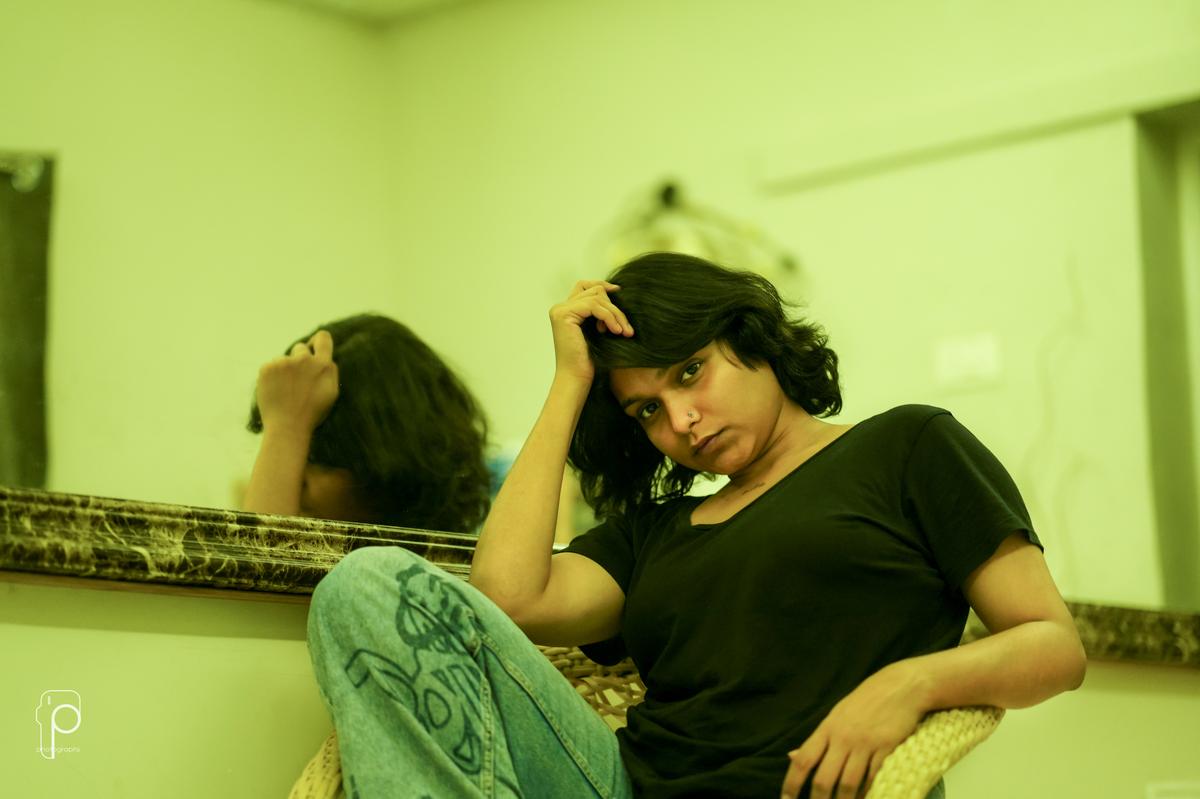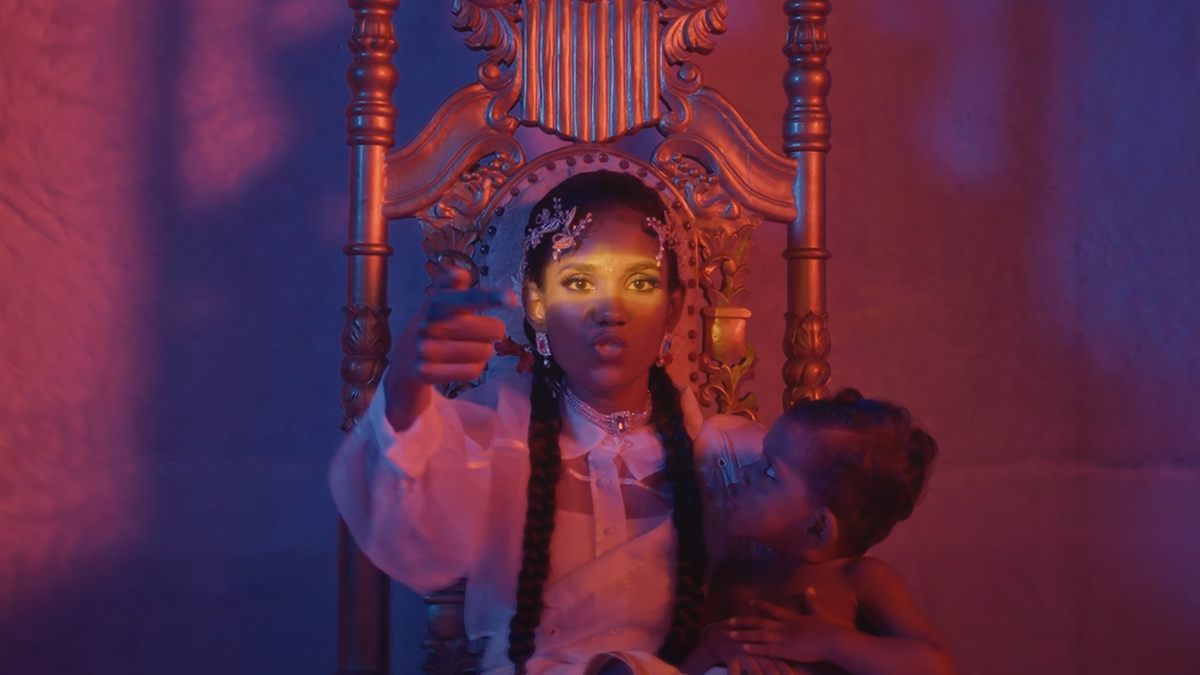The frame is delightfully whimsical. Mrs Go and Debbie Pari, two independent Tamil women rappers, sit on an ornate throne as the beat quickly builds up. ‘Showtime’, their first single together, is a statement cleverly wrapped in snappy beats with a visual language that merits multiple re-watches.
The quirky video shows Mrs Go, her toddler in tow, spitting bars in a pristine white saree: “Chinna sirupazhagi/ iduppu karuppu nerathazhagi/ echil mutham kodutha thai-ku nan per azhagi”, she raps. A self introduction, perhaps? Debbie Pari joins in with her signature phrase, “I’m the G.O.A.T. Vechiko, Debbie Pari vandha show.” The comment section overflows with praise for the women. Some are mothers who look up to Mrs Go for having her toddler as an integral part of her verse and filmography.
The growing Tamil rap circuit now has a powerful feminine voice as more women artistes are making waves with strong writing and unique ideas. While Tamil contemporary rap has seen success more recently with exposure in mainstream cinema, homegrown women artistes are still a minority. But a new crop of young women are on their way to disrupt this monopoly, as more music producers welcome this talent with open arms.
“For the longest time, we only heard the man’s point of view. That is definitely changing,” confirms Navz-47, of ‘Neeye Oli’ fame.
Queens of the verse
North Chennai has birthed many Tamil hip hop artistes in the past. Rubini Gopinatha aka Mrs Go is no different. She rapped in 2015 with a poem she had written while studying at Ethiraj College for Women. Her friends were fascinated that an unfamiliar female voice was experimenting with a different format. “I had no idea what rap meant until then,” she says.
It was in 2018 that she collaborated with fellow indie rapper Asal Kolaar and VC Rapper for her first single ‘En Kathai’, depicting their differing points of view on life in North Chennai.
A few years in, she met Go, a rap artiste and later married him. “I married my favourite artiste,” she giggles. “Only after we got married, did we realise that we are the first rap couple in India.” In more recent outings, Mrs Go’s USP has been her toddler who often appears in her videos. Donning a silk sari and bright red headphones, child in hand, she often appears behind potti kadais (petty shops). “Bringing my baby into this was not a planned move but I felt it’s important to show that despite being a mother, I am able to pursue my dreams and a career.” A lot of good feedback bolstered this idea which eventually became her signature.
Debbie Pari
| Photo Credit:
special arrangement
As far as signatures go, Deborah Sharon aka Debbie Pari who is currently based in Toronto, Canada, puts her feminine identity at the centre of her writing. Rap as a medium is never exclusive of the artiste’s lived realities and so, the writing is never forced.
Debbie attributes her proficiency of the language to the time spent in parish choir groups as a child. Though Blaaze was a sure inspiration, the artistes that really shook her — in class VIII — were Yogi B and Natchatra. “I used to adlib with the boys in class!” she adds. “Being a literature student, women’s writing took a hold of me while in college, especially Maya Angelou’s Phenomenal Woman. These texts pushed me towards thinking about getting our own voices out,” says Debbie. That is when she started listening to hip hop. “My outlook towards the world changed, why do we get an education if the expectation is to remain boxed in as women? This was a central question.”
In 2018, when she was offered an opportunity to rap a ghost-written verse, she turned it down and decided to write her own. Her first song followed in 2018. Her first extended play (EP) will be released this month.
It is not news that self expression forms the cornerstone of this medium. Sabreen Salahudeen, a fairly new entrant in the scene , credits the genre’s instant draw to its scope for individual expression. A 23-year-old single mother who left her profession to become a musician, Sabreen finds the format, and the writing process deeply cathartic. For instance, her track ‘Thaai’ taps into the nitty-gritties of the subconscious guilt that a young mother carries.
Despite being a Malayali who was born and raised in Chennai, she finds comfort in writing and rapping in Tamil.
“Coming from a middle-class family, I always thought I wasn’t privileged enough until I saw the other side of the majority. The realisation that I am in fact very privileged pushed me to write about the socio-political realities around me as an individual.” Sabreen admits that her political awareness has always been half-cooked. “Not just mine, but my friends’ too. We never cared enough to try and understand what’s happening around us. But we need to change that, we are the ones who need to question, right?” says the rapper who hopes to reach the demographic that she herself belongs to, through her searingly honest verse. .

Sabreen Salahuddin aka Ungal Nachi
| Photo Credit:
special arrangement
A sense of belonging
For the Tamil diaspora spread across the country, a personal medium like rap, is also about finding a reliable community in unfamiliar soil. After every club performance, Navz-47 aka Naveeni Athanasius Philips’s inbox are filled with messages from young girls. “Lot of Tamil girls in their 30s come to my show and most often, that’s their first time clubbing. In the diaspora Tamil community, a lot of women were taught to suppress in terms of the way they dress or conduct themselves. Many girls were hence suppressing their feelings,” says Navz. They call her akka, she says.
While most seek advice on how to enter the foreign rap circuit as a young South Asian woman, many are delightfully surprised at the popularity that a Tamil, female voice has gained on a global level.
British-Tamil musician M.I.A did it first, Navz reminds us. “I first thought I invented the genre of rap,” she laughs. “My brother told me to tap into Tupac, Diggy [Simmons] and Nas and when I discovered M.I.A, it all started making sense to me. Because, growing up, I didn’t see women like me in the mainstream. To see M.I.A owning up to her identity and craft really inspired me.”
Born in Sri Lanka, Navz moved to Canada with her family to escape the Civil War, and what followed a rude culture shock. “I started mourning the loss of my identity. Music came in as a form of a savior in my teenage years,” she says Her first song, AMU from 2017, centered around years of bullying that she faced because of her skin colour and accent, has defined what music meant to her. Many singles, albums and exposure in the mainstream cinema through ‘Neeye Oli’ later, her new album titled Fresh off the Boat documenting the journey of a ‘FOB’, a derogatory term often used to refer to immigrants, is dropping this June.

Rapper Navz-47
| Photo Credit:
STUDIOFAIRYTALES
Back home, Mrs Go has been spearheading a quieter community through her social media by inviting novice women rappers to join hands for an upcoming project. “If we host a rap battle now, easily 200 male rappers would show up. That’s sadly not the case for women,” she adds. “A lot of women have been reaching out via social media, especially since 2021. Almost all of them want to start but don’t know how to.” While specific details are not chalked out as yet, the idea is to foster a physical community that Chennai currently lacks.
This would mean events, ciphers and regular community meet-ups. “When they start seeing the sheer interest the format has, they will be more confident. A lot of them are scared of what others would say,” adds Mrs Go.
And so, it only makes sense that women choose the medium of rap to make a statement out of this fear. There is nothing a beat, metre and verse can’t do.

